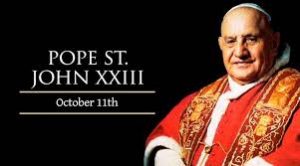HOMILY WEEK 27 05 – Year II
Holding Nothing Back:
Optional Memorial of St. Pope John XXIII
(Gal 3:6-14; Ps 111; Lk 11:15-26)
*******************************************
“After Jesus had cast out a demon…”
This Gospel passage seems to refer to Mary Magdalene, out of whom Jesus had cast seven demons. Visionary Ann Catherine Emerich claims after Jesus had converted Mary, she relapsed, and her last condition was worse than the first. But through the prayers of her sister, Christ converted her again, driving out seven demons this time instead of just one.
Sometimes we tend to unlearn lessons we have learned, only the second time it is seven times harder than the first. Mary Magdalene went on to become a saint. What is this incredible power accomplishing such a radical transformation in the human heart?
The liturgy today invites us to give our hearts and wills to the Lord, holding nothing back, that we may reign with the glorious freedom of the children of God.
We all know the cruel servitude of what Jesus calls the slavery of sin – that despite our best efforts we can’t manage to kick a bad habit or develop a healthy one. We have all heard stories of someone who was sober for many years, but for some reason, in a weak moment, gave way to the temptation to take one drink, fell back into the throes of addiction, and lost everything, including his or her life. As the saying goes, “One drink is too many, and a thousand isn’t enough.”
Where human effort is helpless, Jesus says, “If it is by the finger of God that I cast out demons, then the Kingdom of God has come upon you.” What we are so powerless to do, God can accomplish with His proverbial pinky. And if the Son sets us free, we will be free indeed with the glorious freedom of the children of God.
But how to prevent another relapse? The moral of this parable about the seven demons seems to be that when we reject sin, we have to replace it with something. Nature abhors a vacuum. Indeed, when St. Paul talks about dying to sin, he speaks of living for God in the same breath. Which says that all of the passion and energy and time and determination that we put into sinning in our past, that same passion and energy must now be fully devoted to the love of God.
That is why the Commandment says to love the Lord with our WHOLE heart, mind and strength, for if any part of our heart is not given to the love of God, it becomes a point of vulnerability through which the enemy can all too easily trip us up.
 Today’s optional memorial honours Pope John XXIII, who was born Angelo Giuseppe Roncalli in 1881. In 1904 he was ordained a priest and served as a secretary to the Bishop of Bergamo, then as seminary teacher, sergeant in the medical corps, military chaplain, spiritual director and Apostolic Visitor before being appointed bishop in 1925. In 1953 he was created a cardinal and sent to Venice as Patriarch. At the death of Pius XII, he was elected Pope on October 28, 1958, taking name of John XXIII. His pontificate, which lasted less than five years, presented him to the entire world as an authentic image of the Good Shepherd. Meek and gentle, enterprising and courageous, simple and active, he carried out the Christian duties of the corporal and spiritual works of mercy: visiting the imprisoned and the sick, welcoming those of every nation and faith, bestowing on all his exquisite fatherly care. His social teaching in the encyclicals Pacem in Terris and Mater et Magistra was deeply appreciated.
Today’s optional memorial honours Pope John XXIII, who was born Angelo Giuseppe Roncalli in 1881. In 1904 he was ordained a priest and served as a secretary to the Bishop of Bergamo, then as seminary teacher, sergeant in the medical corps, military chaplain, spiritual director and Apostolic Visitor before being appointed bishop in 1925. In 1953 he was created a cardinal and sent to Venice as Patriarch. At the death of Pius XII, he was elected Pope on October 28, 1958, taking name of John XXIII. His pontificate, which lasted less than five years, presented him to the entire world as an authentic image of the Good Shepherd. Meek and gentle, enterprising and courageous, simple and active, he carried out the Christian duties of the corporal and spiritual works of mercy: visiting the imprisoned and the sick, welcoming those of every nation and faith, bestowing on all his exquisite fatherly care. His social teaching in the encyclicals Pacem in Terris and Mater et Magistra was deeply appreciated.
Pope John XXIII convoked a Roman Synod, established the Commission for the Revision of the Code of Canon Law and summoned the Second Vatican Council. He was present as bishop in his Diocese of Rome through his visitation of the parishes, especially those in the new suburbs. The faithful saw in him a reflection of the goodness of God and called him “the good Pope.” He was sustained by a profound spirit of prayer. He launched an extensive renewal of the Church, while radiating the peace of one who always trusted in the Lord. Pope John XXIII died on the evening of June 3, 1963, in a spirit of profound trust in Jesus and of longing for his embrace. He was canonized April 27, 2014, along with St John Paul II.
The Eucharist is a vigil given to us by Jesus to nourish us, through Word and Sacrament, until he comes again. So, let us give our hearts to the Lord, holding nothing back, that we may reign with the glorious freedom of the children of God.



